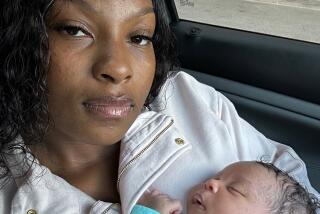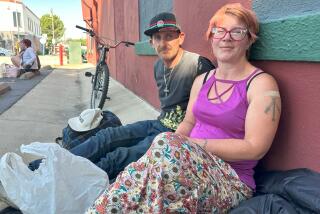Birth control and welfare
- Share via
Re “Tough problem, tough tactic,” Column, Oct. 17
I want to thank Sandy Banks for her column in support of birth-control education for women who are addicted to drugs and whose children end up being “parceled out like puppies.”
I’m a registered nurse and know the potential consequences for these children when a mother has been addicted to drugs or alcohol and/or has not received prenatal care.
I have great respect for Barbara Harris, the foster mother who stepped in and initiated payments to addicted women if they would agree to use birth control. I would like to take that concept a step further.
Too often we see evidence, in The Times and elsewhere, of women who give birth repeatedly while in the welfare system. I suggest that if a woman receives welfare payments, those payments should be contingent on her agreement to have a long-term birth-control method in place.
Perhaps the cycle of welfare could be interrupted, giving women a better chance to improve the quality of their lives and those of their families.
Linda Mann
Sierra Madre
::
Banks has written a truthful, honest appraisal of a hopeless situation with an obvious solution.
Foster care, even with more funding (which is not forthcoming), can never offer 20 years of continuous structure, love, encouragement and support.
As a criminal defense lawyer, I have watched too many graduates of the foster care system, and it is obvious that this system cannot produce happy, successful people.
Harris has a solution that should be embraced by jails, parole, probation and foster care. People should be offered financial incentives to be responsible. There is no right to procreation absent a responsibility to be a good parent.
Ilona Peltyn
Los Angeles
::
It was incredibly heartening to see Banks’ column discussing how birth control is the elephant in the room when dealing with the child-welfare system.
This dilemma not only applies to our domestic welfare system but to poverty and child neglect in other parts of the world as well. Neither our politicians nor our media outlets seem to have the courage to confront this issue openly; I hope that The Times will continue this type of honest dialogue.
Naomi Martinez
Hollywood
::
In Banks’ article, she states that birth control becomes a difficult problem because it represents an intrusion into a delicate area of family life.
Certainly no intrusion occurs when a couple who can afford additional childbearing chooses to proceed on the basis of that very private decision. However, when a mother receiving welfare bears another child, the decision becomes a very public choice; taxpayers foot the bill.
Ben Edward Akerley
Los Angeles


